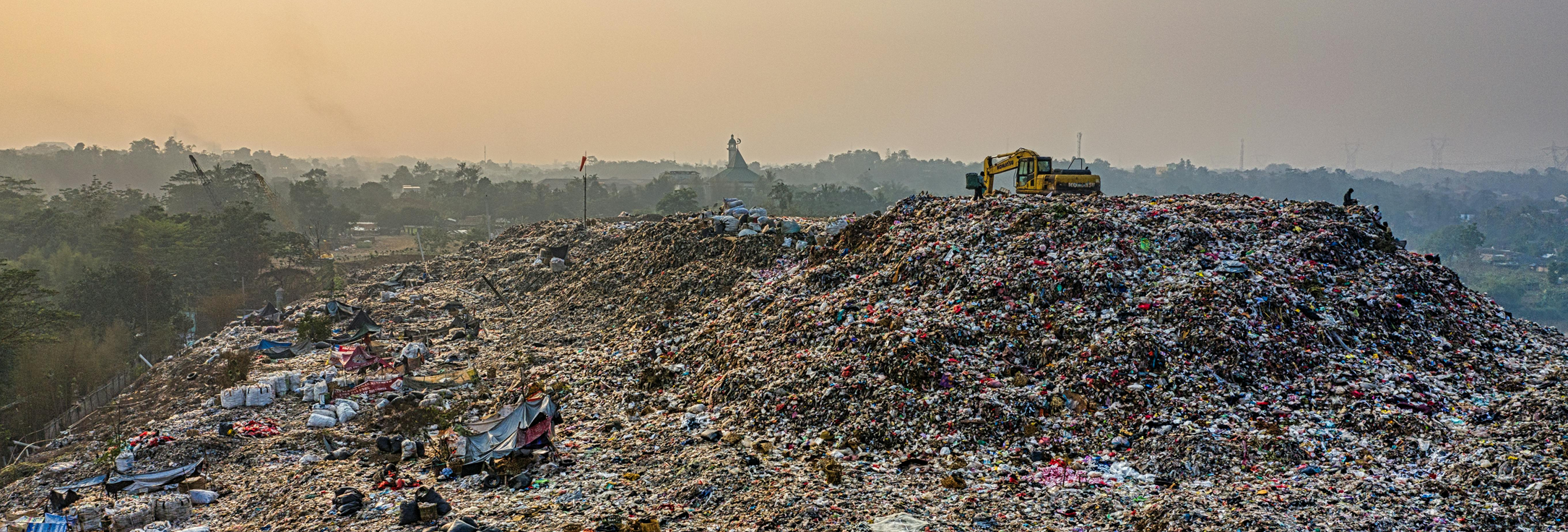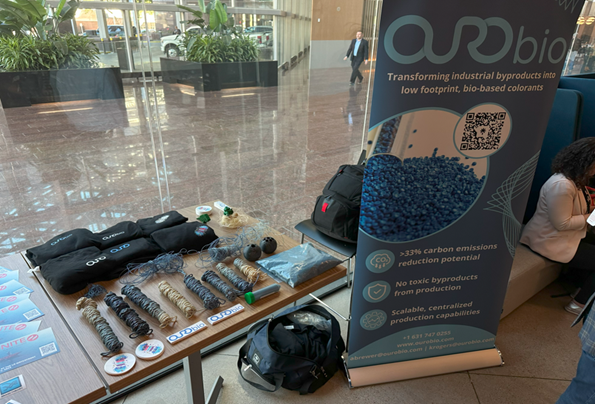
The talk of innovation labs in France and clean energy research hubs in the U.S., 25-year-old Alec Brewer is shaping the future of sustainable materials. Currently based in New York City, Alec is a synthetic biology innovator whose entrepreneurship journey began with a spark of scientific curiosity from a presentation on plastics by his peers.
When I first came across Alec Brewer’s work, what stood out to me wasn’t just his technical expertise — it was his deep commitment to reimagining waste as a resource, to turning waste into something valuable. Working in the sustainability space myself, I constantly seek out young people who push boundaries and come up with practical, impactful solutions. Alec struck me as someone who doesn’t just talk about the circular economy but actively contributes to it, developing non-toxic alternatives to synthetic plastics at the company he co-founded, Ourobio.

A showcase of Alec's work at South by Southwest.
What makes Alec an inspiration to me, and what prompted me to conduct this interview, is the way he combines deep scientific knowledge with a remarkable, on-the-ground commitment to change. Across his work, he has consistently aligned innovation with real-world impact. His work challenges all of us to reimagine plastics and think more creatively about how biotechnology can be part of the climate solution, providing a constant reminder that even the most entrenched systems can be redesigned for good.
The Spark that Started It All
Alec’s synthetic biology (synbio) climate journey began when he first realized he could use microbes to develop non-toxic alternatives for synthetic plastics and additives.
It’s no secret that petrochemicals and other hard-to-recycle materials are leading contributors to environmental and human health issues. But “It was seeing my research partners present on the plastic problem and polyhydroxyalkanoates (PHAs) for the very first time that was enlightening,” Alec says, referring to biodegradable substances offering a viable alternative to traditional plastics. That experience opened his eyes to the tremendous potential of biology to solve some of the planet’s most pressing environmental challenges.

PHA production via bioreactor.
A Community of Inspiration
While Alec doesn’t point to a single role model, he credits a strong network of friends and colleagues for their inspiration and support. “People I have come to follow, speak with and learn from personally in varying capacities include Dr Keith Kozminski, whose work in cell biology has inspired me a lot, as well as Elliot Roth, whose work in biotechnology spurs me on,” he says. Keen to keep engaged with the latest in science, sustainability, and innovation, Alec is an avid follower of newsletters and newsfeeds. He also has a long list of public figures whom he would love to speak with someday, including YouTube educators Derek Muller and Mark Rober as well as scientists Lance Collins and Tobi Akinyemi.

Alec is the co-founder and CEO of Ourobio, a company devoted to "catalyzing the circular bioeconomy."
Building something that matters
Though obviously passionate about the science involved, Alec says the best part of his work is the human element. What makes it all worthwhile, he says, is “getting to work with so many intelligent, caring people and connecting them through biomaterials and biomanufacturing.” His mission is to scale the production and adoption of sustainable biomaterials — literally and figuratively making a material impact.
Already, Alec has reached several proud milestones, from launching the award-winning Transfoam iGEM project as a University of Virginia student in 2019 to founding the circular economy-focused start-up Ourobio in 2020 and securing multiple grants and accelerator placements. Alec’s work has been recognized by Biofabricate, the Indiana Soybean Association, leading clean energy researchers from the U.S. Department of Energy, and many others.
From the anonymity of his days as a student doing lab experiments to international recognition as a materials science innovator, Alec’s trajectory has been anything but ordinary.

Colony growth and pigment production from organisms.
Overcoming Challenges
Of course, Alec has faced hurdles on the path to success. He has faced funding shortages, lab limitations, research and development setbacks, and reorgs and bankruptcies among corporate partners. But he’s navigated these hurdles with strategic thinking and the support of friends — some of whom offered legal expertise that proved invaluable. His advice to his younger self? “Make sure you can cover your bills early on.”
Looking Ahead
Alec’s future is looking bright — and busy. He’s preparing to launch new computational biology tools and is developing an idea for a sustainable dog toy brand, Phaws. Additionally, he’s working on a personal website and a range of side projects blending code, creativity, and climate action.

A prototype dog toy is subjected to rigorous chew testing.
Advice for Aspiring Changemakers
For those considering starting their own environmental initiatives, Alec offers practical wisdom: “Go find someone who works in or adjacent to sustainability. Figure out what their problems are, how to solve them, and how to get paid to do so. Then repeat — and get better at it each time.”
You can connect with Alec on LinkedIn to follow his journey and learn more about his work in biomaterials and sustainability. And if you know a young innovator I should interview, reach out to me there as well!
Ezinne is a passionate advocate for sustainable development and human rights, actively contributing to global initiatives led by PwC, the UN, and the World Bank, among others. She has received international recognition for leadership and innovation and has represented her native Nigeria at global climate fellowships. With a strong interest in technology-driven solutions, Ezinne supports Micro, Small, and Medium Enterprises (MSMEs) and shares insights through global platforms like the UN and Google Women Tech Makers.
Landfill photo courtesy of Tom Fisk, Pexels. All other images courtesy of Ourobio.



